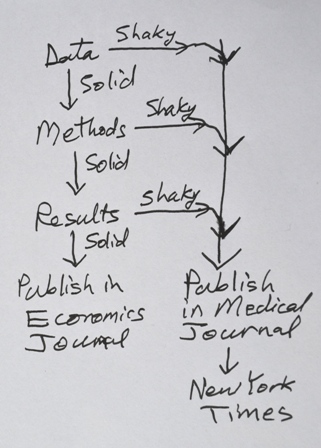As you may remember, June 8th is World IPv6 Day, where hundreds of major players including Google, Facebook, and Yahoo will all turn on IPv6 access (but then turn it off again at the end of the day). It seems odd to make a big to-do about IPv6 Day then go back to business as usual after 24 hours. Most end users will not notice the change, as most of us connect through our various ISP networks using IPv4 addresses anyway.
So, what happens if IPv6 isn’t taken up by the movers and shakers of the networking world?
Proponents of IPv6 make dire predictions about the fate of the Internet if usage of IPv6 doesn’t rise dramatically in the next few years. They say the complexity of the Internet infrastructure will increase, network operations costs will rise, and innovation will be hampered. This is due to the multiple layers of network address translation (NAT) devices that will be required to share limited IPv4 addresses among a rapidly growing base of users and devices.
“If IPv6 fails to catch on, then the Internet will include nesting of NAT upon NAT,” says Russ Housley, chairman of the Internet Engineering Task Force (IETF), the Internet standards body that created IPv6. “I hope this is not our future because it would be a very fragile Internet, making innovation more difficult. On the other hand, IPv6 will greatly reduce the need for NAT, restoring the opportunities for innovation that were envisioned by the original Internet architecture.”
Dorian Kim, vice president of IP engineering, Global IP Network at NTT America, a leading provider of IPv6 services in the United States, says that without IPv6 the Internet “will be even more heavily NATed than it currently is, but life will mostly go on. Unfortunately, such an Internet likely will have a negative effect on potential development of application or service innovation due to inherent issues with NATs. Additionally, should service providers become more and more reliant on NATs, this will probably change the cost and scaling trajectories of Internet services over time due to high cost and limited scalability of large-scale NAT solutions.”

 Aid Watch has complained before about shaky social science analysis or shaky numbers published in medical journals, which were then featured in major news stories. We questioned creative data on stillbirths, a study on health aid, and another on maternal mortality.
Aid Watch has complained before about shaky social science analysis or shaky numbers published in medical journals, which were then featured in major news stories. We questioned creative data on stillbirths, a study on health aid, and another on maternal mortality.

